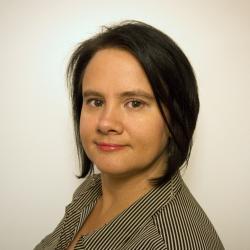Libraries’ Holly Matteson Balances Multiple Priorities as Nontraditional Student

Holly Matteson, a 36-year-old English education major at WSU, is not your typical student. She and her husband married when she was 19. For the next 13 years, Holly was a stay-at-home mother for their two children while her husband supported them in a lucrative, but unsatisfying job.
As their children grew older, they both realized that it was time to make a change and set an example for their children by getting the degrees they would need for the careers they wanted.
“It was hypocritical of us to push our children to do their best in school and encourage them to go to college after high school, when we hadn’t done those things,” Holly said.
For Holly, this was a huge step. She is a first-generation college student and the first person in her immediate and extended family to go to college.
“Getting married and starting a family at a young age doesn’t leave much time for figuring yourself out,” she said.
Originally a business major working at Dissmore’s grocery store in the floral department, Holly discovered what many early undergraduate students do: She didn’t click with the classes she was taking for her major.
Fortunately, she was also taking introductory English and receiving positive feedback from her professor for her writing. After another semester of exploring different areas within the English department, she found her niche, took the leap, and switched majors.
Holly has also developed her ideas into a working framework for social justice analysis of texts in the classroom called PROGRESS (Positionality, Race, Orientation, Gender, Relationships, Environment, Social Class, and Stereotypes).
In January, she submitted a proposal to the National Council of Teachers of English (NCTE) detailing her framework and will present it at the NCTE Annual Convention this November. She has also been awarded a summer mini-grant to further develop PROGRESS into a working handbook for teachers.
“When I present PROGRESS at NCTE in November, my hope is that English teachers will incorporate this framework into their classrooms to help students see the world through the lens of social justice,” Holly said.
How does a mother of two teenagers, with a husband also in college, find the time and energy to excel in her classes, develop and expand a classroom teaching tool, and work 10-30 hours a week? The answer is she works in the WSU Libraries.
After switching majors, Holly realized that her job at Dissmore’s wasn’t going to leave her the time and space she needed to fully participate in her education and her family. So when a friend recommended she apply for a job at the Libraries, she jumped at the opportunity. In her position as staff assistant in Access Services, she can help support her family without sacrificing her educational goals.
—Story written by Rochelle Thompson, WSU Libraries development program coordinator
Holly is one of some 120 students WSU Libraries employs part-time throughout the year to work in all areas of library operations, from checking out, shelving and repairing books to answering patron questions, scanning collections and providing technical support. Their jobs here give them the opportunity to attend their rigorous courses without the pressure to put work above school. Your generous support as donors to the Libraries continues to ensure that more WSU students like Holly will find the support and encouragement they need as they pursue their formal educations.